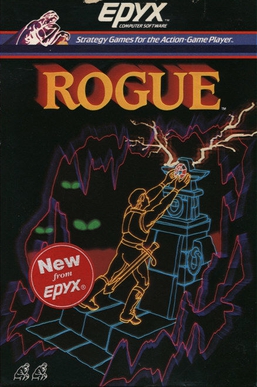
Eric Steven Raymond, often referred to as ESR, is an American software developer, open-source software advocate, and author of the 1997 essay and 1999 book The Cathedral and the Bazaar. He wrote a guidebook for the Roguelike game NetHack. In the 1990s, he edited and updated the Jargon File, published as The New Hacker's Dictionary.

Manga are comics or graphic novels originating from Japan. Most manga conform to a style developed in Japan in the late 19th century, and the form has a long history in earlier Japanese art. The term manga is used in Japan to refer to both comics and cartooning. Outside of Japan, the word is typically used to refer to comics originally published in the country.

Rogue is a dungeon crawling video game by Michael Toy and Glenn Wichman with later contributions by Ken Arnold. Rogue was originally developed around 1980 for Unix-based minicomputer systems as a freely distributed executable. It was later included in the Berkeley Software Distribution 4.2 operating system (4.2BSD). Commercial ports of the game for a range of personal computers were made by Toy, Wichman, and Jon Lane under the company A.I. Design and financially supported by the Epyx software publishers. Additional ports to modern systems have been made since by other parties using the game's now-open source code.
roff is a typesetting markup language. As the first Unix text-formatting computer program, it is a predecessor of the nroff and troff document processing systems.

In some operating systems, including Unix and Linux, a pseudoterminal, pseudotty, or PTY is a pair of pseudo-device endpoints (files) which establish asynchronous, bidirectional communication (IPC) channel between two or more processes. The master provides means by which a terminal emulator process controls the slave. The slave emulates a hardware text terminal device. PTY are similar to bidirectional pipes.
High Level Assembly (HLA) is a language developed by Randall Hyde that allows the use of higher-level language constructs to aid both beginners and advanced assembly developers. It fully supports advanced data types and object-oriented programming. It uses a syntax loosely based on several high-level programming languages (HLLs), such as Pascal, Ada, Modula-2, and C++, to allow the creation of readable assembly language programs, and to allow HLL programmers to learn HLA as fast as possible.

The Interactive Disassembler (IDA) is a disassembler for computer software which generates assembly language source code from machine-executable code. It supports a variety of executable formats for different processors and operating systems. It can also be used as a debugger for Windows PE, Mac OS X Mach-O, and Linux ELF executables. A decompiler plug-in, which generates a high level, C source code-like representation of the analysed program, is available at extra cost.
Homebrew, when applied to video games, refers to games produced by hobbyists for proprietary video game consoles which are not intended to be user-programmable. The official documentation is often only available to licensed developers, and these systems may use storage formats that make distribution difficult, such as ROM cartridges or encrypted CD-ROMs. Many consoles have hardware restrictions to prevent unauthorized development.

QuickPar is a computer program that creates parchives used as verification and recovery information for a file or group of files, and uses the recovery information, if available, to attempt to reconstruct the originals from the damaged files and the PAR volumes.

Randall Hyde is best known as the author of The Art of Assembly Language, a popular book on assembly language programming. He created the Lisa assembler in the late 1970s and developed the High Level Assembly (HLA) language.

Hacking: The Art of Exploitation (ISBN 1-59327-007-0) is a book by Jon "Smibbs" Erickson about computer security and network security. It was published by No Starch Press in 2003, with a second edition in 2008. All of the examples in the book were developed, compiled, and tested on Gentoo Linux. The book also comes with a CD that contains a Linux environment with all the tools and examples used in the book.
Improper input validation or unchecked user input is a type of vulnerability in computer software that may be used for security exploits. This vulnerability is caused when "[t]he product does not validate or incorrectly validates input that can affect the control flow or data flow of a program."

An edit conflict is a computer problem that may occur when multiple editors edit the same file and cannot merge without losing part or all of their edit.

IEs4Linux is a free and open source script that allows a user to run Internet Explorer (IE) using Wine. It is possible to install Internet Explorer versions 5, 5.5, and 6, along with partial functionality of IE7.

Penguin Random House LLC is an Anglo-American multinational conglomerate publishing company formed on July 1, 2013, with the merger of Penguin Group and Random House. Penguin Books was originally founded in 1935 and Random House was founded in 1927

The Linux Programming Interface: A Linux and UNIX System Programming Handbook is a book written by Michael Kerrisk, which documents the APIs of the Linux kernel and of the GNU C Library (glibc).

Michael Kerrisk is a technical author, programmer and, since 2004, maintainer of the Linux man-pages project, succeeding Andries Brouwer. He was born in 1961 in New Zealand and lives in Munich, Germany.
Al Eisenstat was an American lawyer and business executive. He served as general counsel, Senior Vice President and board member at Apple Computer.
Sigreturn-oriented programming (SROP) is a computer security exploit technique that allows an attacker to execute code in presence of security measures such as non-executable memory and code signing. It was presented for the first time at the 35th IEEE Symposium on Security and Privacy in 2014 where it won the best student paper award. This technique employs the same basic assumptions behind the return-oriented programming (ROP) technique: an attacker controlling the call stack, for example through a stack buffer overflow, is able to influence the control flow of the program through simple instruction sequences called gadgets. The attack works by pushing a forged sigcontext structure on the call stack, overwriting the original return address with the location of a gadget that allows the attacker to call the sigreturn system call. Often just a single gadget is needed to successfully put this attack into effect. This gadget may reside at a fixed location, making this attack simple and effective, with a setup generally simpler and more portable than the one needed by the plain return-oriented programming technique.

SuperSU is a discontinued proprietary Android application that can keep track of the root permissions of apps, after the Android device has been rooted. SuperSU is generally installed through a custom recovery such as TWRP. SuperSU includes the option to undo the rooting. SuperSU cannot always reliably hide the rooting. The project includes a wrapper library written in Java called libsuperuser for different ways of calling the su binary.













